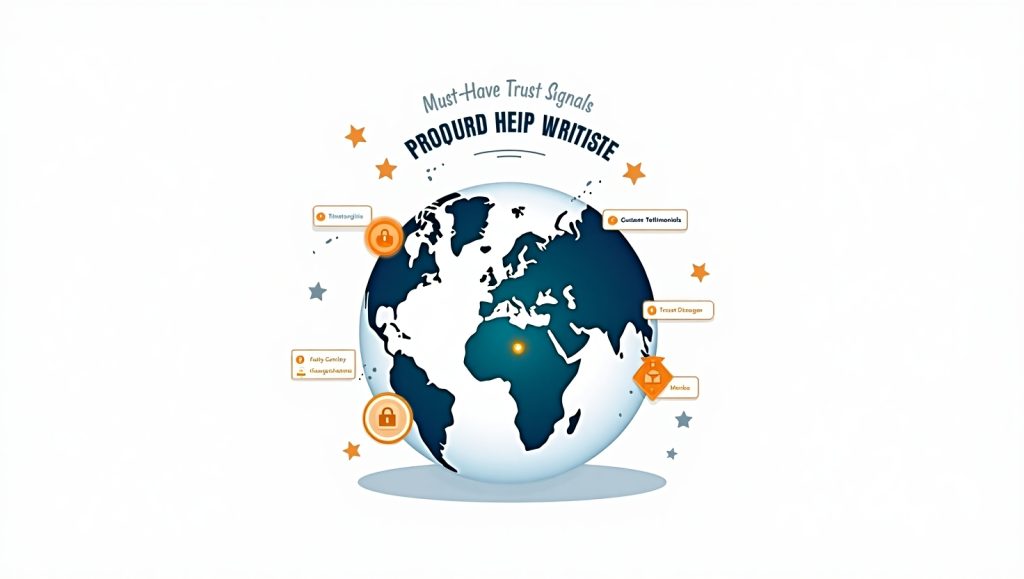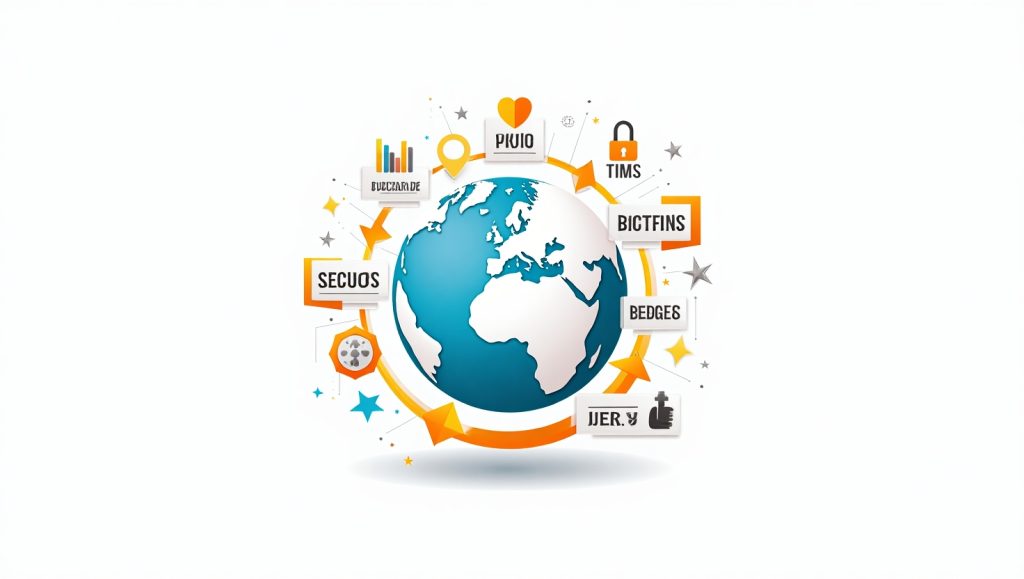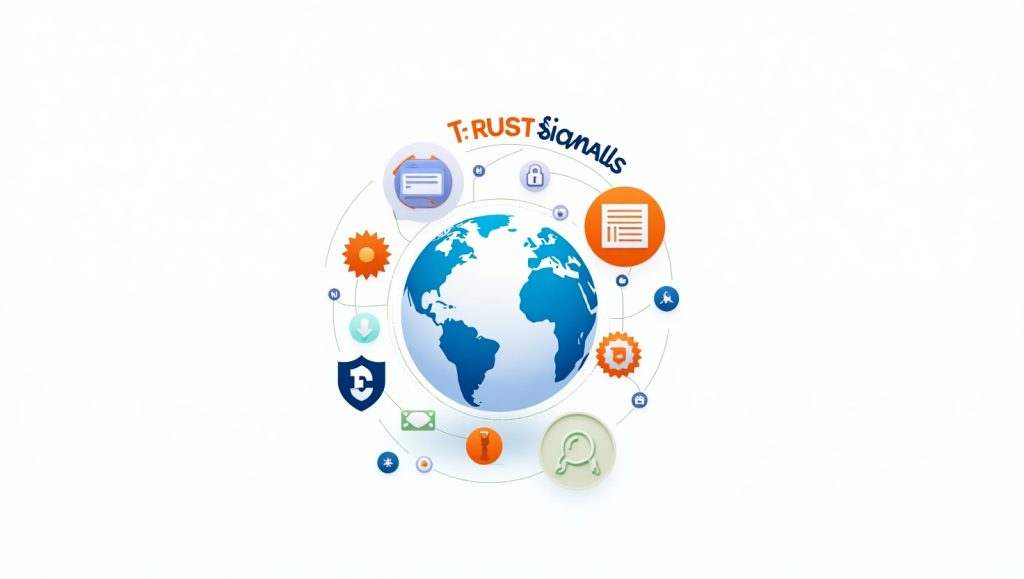
Trust isn’t just earned; it’s granted with a very powerful tool that can cause havoc in the online realm, one click at a time. In small business terms, trust is a must to earn in a matter of seconds to maintain that customer or else lose him to competition. Luckily, certain potent trust signals can provide that little extra credibility to your website and assure visitors that your business is on the up and up, dependable, and worth their time.
1. Clear Contact Information
Visitors want to know that you are available to reach should the need arise, and they want to reach you easily. The moment a visitor lands on your website, he or she seeks solace. In the fastest way possible, providing accurate and clear contact information makes the visitor feel secure. Using a quick link to “Contact Us” or burying this information in the footer is not a good practice. It should be in prominent places, such as your homepage header or the footer, or even in the service or about pages. The more accessible you are, the more trustworthy you become.
Why It Builds Trust
When businesses are transparent about their contact information, it gives visitors a sense of accountability. They feel there is a real person behind the screen, not just a website that could easily disappear overnight. Clear-cut contact details say you are open to communication, willing to solve problems, and not hiding from customer service liability; that openness can be one more factor to drive conversions.
2. Social Proof and Testimonials
One of the very first things that any recently arrived visitor to your site will think is: “Can I trust these guys? That’s where social proof comes in as your best friend. It really is digital word of mouth-in customer testimonials and reviews and case studies as well as user-generated content such as photos and comments.
If your customers have great things to say about you, don’t keep it just for yourself: Show that on your homepage, on the service pages, or in a dedicated ‘Reviews’ section. Better still, add names and photos-and perhaps even short video testimonials-when you can; it all adds to authenticity.
Why It Builds Trust
When potential customers see other real people having positive experiences, to some extent, it makes them feel like they’re not jumping into something unknown. This helps lower the psychological threshold that comes with making a purchase or booking a service. When potential buyers see genuine concerns or needs in others, they see their own problems being solved well by your business; therefore, they will very likely join in.
3. Secure and Professional Website Design
Having the best service in your industry means nothing if your site appears unsightly and unprofessional because visitors will bounce straight away. First impressions count, and online, this is even more important. A neat, mobile-friendly and properly organized site tells users that you are serious about your business.
Also, ensure that your website is secured with HTTPS and has an SSL certificate. That miniature padlock beside your URL is not just a technical function but a visual cue of safety. Without it, browsers might even mark your site as “Not Secure,” which could be a quick trust destroyer.
Why It Builds Trust

Design is perceived as professional by people. However, if a website is designed poorly, it looks untrustworthy regardless of how much you trust it behind the scenes. It also protects the data SSL encryption supposedly protects: payment details, contact form information, etc.
Putting money on a well-designed secure site is an investment in your credibility right away. There are quite a number of themes in WordPress that will offer a classy look to a website at a minimum cost-that is why we say professional themes and plugins to this extent will secure not just the appearance of the site but also its security.
4. Clear Policies: Privacy, Returns, and Terms
They may be boring, but policies are absolutely necessary. Your privacy policy, return policy, and terms of service are the fine details of trust. These policies show that your business has considered the details and respects the rights of its customers. Transparent policies must be in place, especially when selling products and when collecting personal information.
These pages do not have to be long or use legalese; just make them simple, honest, and visible. Place links to these policies in your footer and refer to them during checkout and sign-up processes..
Why It Builds Trust
Users are more likely to be inclined to proceed when they know what they are getting into. For example, knowing the return policy makes buying something feel less risky, so even though they fully intend to keep the purchase, they derive comfort from the fact that they may return it. A privacy policy tells your consumers that you won’t misplace their personal information or sell them to third parties. To make things even more fresh, data privacy concerns have grown ever valid these days. Trust is built when people feel their rights are respected and their information is safe.
5. About Page with Real People Behind the Brand

This type of page puts more than just its history out there; it brings in the narrative of the brand, its values, and most importantly, the people working for it. Why you started it, what you stand for, and who is on your team make it human and relatable.
That page is for you to bond emotionally with your audience; put in some imagery of your people, personal bios, and interesting fun facts. Talk about how you participate in your community if you are a small business or tell people what you like about your town. That kind of authenticity strikes a real chord.
Why It Builds Trust
Visitors want to see who they’re buying from. When you show your face (or your team’s), it helps break down walls and builds that person-to-person connection. It reassures visitors that your business isn’t just another faceless e-commerce site—it’s built and run by real, caring people.
Adding a video intro from the founder or behind-the-scenes photos can give even more personality to your site. The more human your website feels, the more likely people are to trust—and support—you.